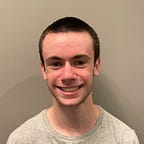Democratic Innovations at Yale
There is a growing divide between political parties in the United States today, and, consequently, a lot of ruined friendships and contentious family dinners. Many Americans believe it does not have to be this way. Democratic Innovations, a program housed within Yale’s Institute for Social and Policy Study (ISPS), aims to mitigate our nation’s political divisions by using technology to find consensus among constituents.
I recently interviewed Matthew Meyers, a Yale undergraduate student who leads a student research group at Democratic Innovations, to learn more about his group’s mission and how they are achieving it. Matthew’s research focuses on fostering an Open Democracy. An Open Democracy can mean different things, but in general it is one where participation is increased and the wants of the constituents are clearer, leading to stronger systems of government. It centers around the notion that constituents’ participation in democracy should involve more than simply casting a ballot; it calls for more open institutions such as citizens’ assemblies and public referenda. With increased communication and engagement, it should be easier for politicians to serve the people, and if politicians do not fulfill their responsibility of serving the people, it should be easier for people to know about their politicians’ failures and vote them out.
In order to promote an Open Democracy, Matthew’s research uses a software called Polis. Polis, an open source opinion polling tool, is used to collect data regarding specific issues. Polis works by allowing users to express their opinions via short statements (under 140 characters); participants engage by reacting to such statements in the form of Agree, Disagree, or Pass. Polis then places participants into different groups, or like-minded clusters, ultimately identifying “consensus statements” in order to build bridges across groups. For example, if a poll is conducted to better understand the public’s opinion regarding the homelessness crisis, Polis might find one group of people who support more integrated housing and another who support more homeless shelters. Even though the line between those groups might seem blurred at the onset, Polis is able to draw that line using machine learning. Polis then finds the “bridges” between these groups and makes a visualization of the groups, making it easier to find compromise. Polis is already being used by the Taiwanese government, and Matthew’s group hopes to implement the technology in New Haven as well.
Polis is not perfect, however. It works best when the issue at hand is one where most agree a problem exists, but there is not a consensus regarding how to fix the problem, such as increased crime and policing, and the housing and homelessness crises. On heavily polarized issues, such as the gun laws and reproductive rights, finding a “bridge” is more challenging.
Right now, Matthew’s group is working on two projects. One of them is trying to convince the New Haven government to implement Polis in order to poll its citizens about local issues. They hope to use the technology to give the New Haven City Hall a clear plan to address homelessness, crime, policing, and other local issues. The other project is testing the usefulness of Polis’s visualization. Polis is able to visually show different groups of opinions, and Matthew’s group is currently testing the effectiveness of that visualization.
Technology, specifically social media, is frequently blamed for contributing to the increasing political divide in our country by amplifying fringe voices and making it harder to find consensus. Democratic Innovations believes it is our responsibility to harness technology to strengthen our democracy as opposed to passively allowing technology to further drive a wedge between us. Polis may be a new technology, but the folks at Democratic Innovations believe a key part of the solution to America’s current political polarization and distrust of our government lies in using technology to bring people together to constructively talk about issues and find real solutions. By using pioneering technology to halt the polarization of political positions in America and start building bridges, Democratic Innovations is strengthening our political system by fostering an Open Democracy.
